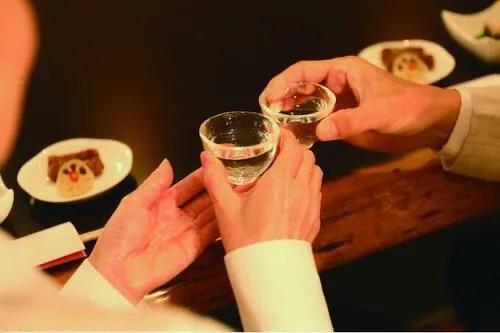Why does alcohol consumption in diabetics lead to a sharp rise in blood sugar?
Alcohol consumption by diabetics usually causes a decrease in blood glucose because alcohol may inhibit hepatic glycogenolysis and gluconeogenesis. When the body needs a lot of glucose after drinking, the liver cannot provide enough sugar, and the person will experience a decrease in blood glucose or even hypoglycemic coma.

These patients are usually alcoholic, thin and relatively old.
However, in clinical practice, we often see some emergency patients who are sent to the hospital with very high blood glucose, even to diabetic ketoacidosis or even diabetic hyperosmolar coma.
What's going on here? Those diabetic friends who expect to drink to bring their blood sugar down will be puzzled.
The main reason why patients have high blood sugar after drinking is that meals are usually high in calories when drinking, and you can't help but eat a lot of food when the atmosphere at a dinner party is heated. Frequent drinkers are often overweight or obese for this reason.

People who drink more heavily are bedridden after drinking, with less activity, the calorie intake is not consumed in a timely manner, it will be accumulated in the body, the amount of fat increases, obesity occurs, insulin resistance increases, and blood glucose will be at a relatively high level.
Diabetics who drink alcohol often forget to use their glucose-lowering medications, which adds to their already high blood sugar, and they can experience elevated blood glucose and acute metabolic disturbances that can lead to diabetic ketoacidosis or hyperosmolar coma.

Alcohol is not recommended for diabetics, and those applying hypoglycemic medications should abstain from alcohol, whether it is low, high or fluctuating blood sugar, which has a more pronounced effect on the body. A poor lifestyle will definitely take its toll on the body!
I'm Dr. Sun, follow Dr. Sun on sugar, continue to learn about quality health knowledge, and follow the must reply!
I don't think that's necessarily true.
Drinking too much alcohol affects 3 major functions of the human body to induce the development of diabetes
Excessive alcohol consumption affects the functioning of insulin: For insulin to work, it must also rely on a specific signaling pathway that transmits insulin's signals into the cell, thus exerting its metabolic regulation of nutrition. Excessive alcohol consumption can affect multiple links in this pathway, affecting the normal functioning of insulin.
Excessive alcohol consumption can affect glucose metabolism: the liver is an important digestive organ in the human body, and plays an important role in maintaining normal glucose concentration. When the concentration of glucose absorbed from the intestines into the blood increases, the liver will synthesize hepatic glycogen and store it; when the concentration of blood glucose decreases, the decomposition of hepatic glycogen produces glucose and releases it into the blood in order to maintain the stability of blood glucose level.
According to research, alcohol and its metabolite acetaldehyde affect the liver's sugar metabolism, and excessive alcohol consumption can cause disorders of glucose metabolism and trigger diabetes.
Excessive alcohol consumption pancreatic islet damage: excessive alcohol consumption can cause oxidative damage to the pancreatic islets, making pancreatic islet cells apoptosis, resulting in impaired pancreatic islet function. If the insulin secreted by the pancreatic islets is absolutely or relatively lacking, it will cause the glucose concentration in the blood to rise, and then a large amount of sugar is excreted from the urine, and symptoms of diabetes such as polydrinking, polyuria, polyphagia, emaciation, dizziness, and fatigue will appear.
If you continue to consume large amounts of alcohol, you will further develop the condition and develop serious complications that will threaten your health.
Should diabetics quit drinking?
Since alcohol has so many effects on diabetes, should diabetics quit drinking? In fact, in the long run, diabetic patients should completely stop drinking, but from a practical point of view, there is a certain degree of difficulty, and a small amount of alcohol is still permissible under certain conditions.
Drinking alcohol causing a sharp rise in blood sugar? If this occurs, then consider what kind of wine is this wine? Is it a high glycemic substance that has been added? If a high glycemic substance has been added, then drinking this type of wine will indeed cause a short-term rise in blood sugar. Some high-grade wines do add additives in order to create a good taste of the wine.
Generally speaking, ordinary wine drinking, will generally cause low blood sugar, this is because alcohol will inhibit the decomposition of liver glycogen, the human body's blood sugar has several parts of the composition: liver glycogen decomposition, myoglycogen decomposition, the direct conversion of food to provide; any kind of vacancies will affect the high and low blood sugar.
Do not drink on an empty stomach, diabetes is quite dangerous to drink on an empty stomach, and is to drink in moderation is best not to drink, the world every day there are some diabetics drink too much, just go. The hypoglycemic complications of diabetes can be quite dangerous.
Alcohol can inhibit the breakdown of hepatic glycogen into glucose, after drinking alcohol, the general blood glucose first lowered, drink too much hypoglycemia risk.
Alcohol is very high in calories, and when the body slowly absorbs and metabolizes the alcohol, it again tends to cause prolonged hyperglycemia. Blood sugar rises a few hours after drinking, and it rises very high when you drink too much.
So, the effect of alcohol alone on blood sugar is that it's easy to start low and easy to go high later.
Sugar lovers should not drink on an empty stomach to avoid hypoglycemia; often, when you drink, you will eat, and your blood sugar will also be affected by the food at the same time.
I. Red wine
Red wine is brewed by natural fermentation of fruit wine, grape juice accounts for more than 80%, by the natural fermentation of sugar inside the grape alcohol accounted for 10% to 30%, and other important ingredients are tartaric acid, pectin, minerals and tannins. Mainly carbohydrate components, sugar lovers should not drink more, occasionally drink a little red wine or can, but also can help soften blood vessels.
Red wine is high in carbohydrates, sugar lovers drink too much, blood sugar may rise a lot, causing the risk of ketoacidosis, there is a type 1 sugar lover, wearing insulin pumps young men, because of drinking about a few bottles of red wine, causing ketoacidosis coma hospitalized, after the resuscitation only out of danger.
II. White wine
Baijiu contains alcohols, esters, vitamins, methanol, acetaldehyde, heteroalcoholic oils and so on. Some of them are not good for health, and the high alcohol content of white wine has a big impact on blood sugar. Sugar lovers are better off without white wine.
White wine too high alcohol will inhibit hepatic glycogen output, drinking white wine on an empty stomach is very easy to hypoglycemia, I have seen a healthy person, no diabetes, very thin, 70 years old moncler, because of drinking half a catty of white wine, fainted by the ambulance was pulled down to the emergency department resuscitation, glucose as low as 1.7 mmol / L, transfusion of a lot of glucose to turn to safety. Later hospitalized in the endocrinology department to monitor blood glucose, and did not have diabetes, blood sugar is very normal.
Diabetics are more susceptible to alcohol inhibition of hepatic glycogen output and are at greater risk of hypoglycemia than healthy individuals.
III. Beer
Beer contains barley, water, hops and yeast. It is mainly carbohydrates and contains a lot of gas, which is not good for your health and is best avoided by sugar lovers.
Sugar lovers who enjoy drinking alcohol very much can refer to the following dosage for a slight taste when their blood sugar is good.
Drink alcohol up to 1-2 times per week, controlling the amount of alcohol to less than 15 grams per session for women and less than 25 grams per session for men.
15 grams of alcohol equivalent to 450 ml of beer = 150 ml of red wine = 50 ml of low-alcohol white wine (alcohol ≤ 38 degrees)
25 grams of alcohol equivalent to 750 ml of beer = 250 ml of red wine = 75 ml of low-alcohol white wine (alcohol ≤ 38 degrees)
Alcohol consumption is accompanied by a large amount of food intake, which can cause a rapid rise in blood glucose in a short period of time. However, drinking alcohol will cause a large amount of insulin secretion, and many people's blood glucose will drop and fall below the daily value after drinking alcohol for a period of time. Excessive alcohol consumption can damage the function of pancreatic islets, which is not conducive to blood glucose control in diabetic patients.
This question and answer are from the site users, does not represent the position of the site, such as infringement, please contact the administrator to delete.